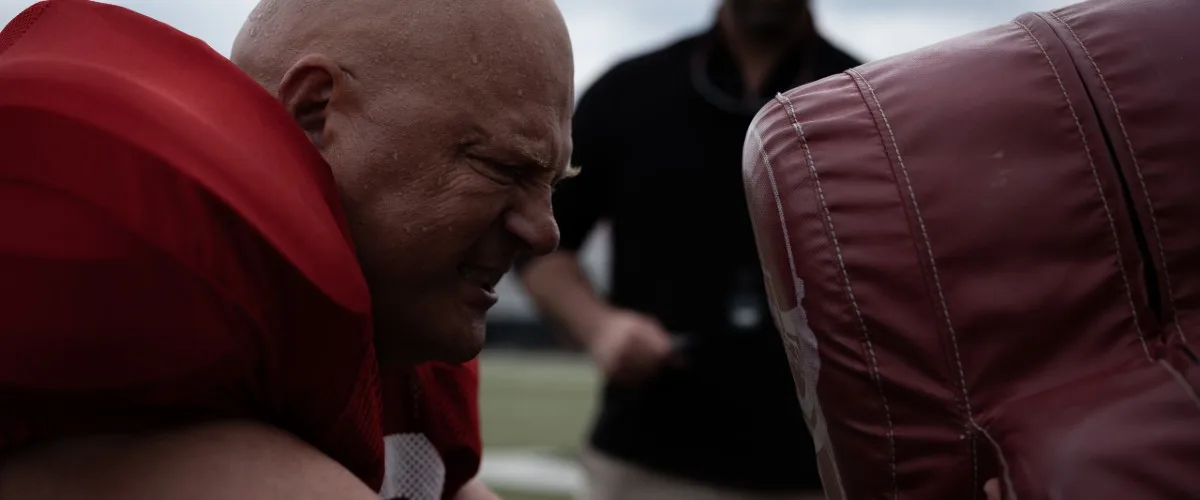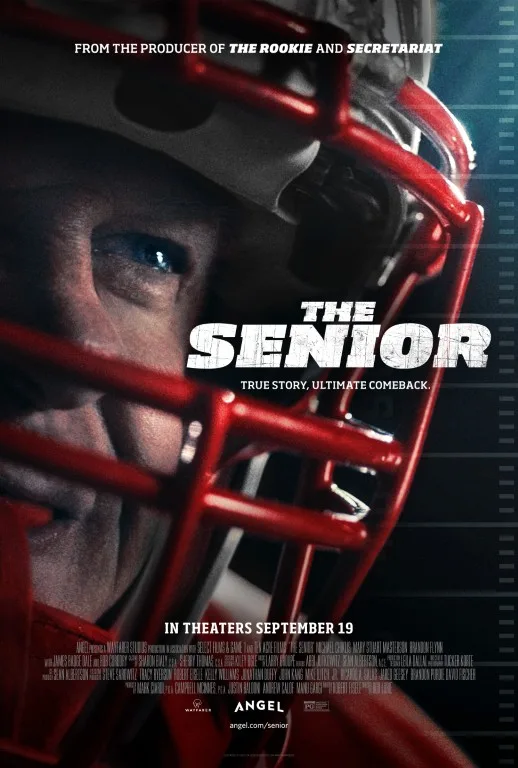The title of ‘The Senior” has two meanings. It is based on the true story of Mike Flynt, a 59-year-old grandfather who discovered that, through a technicality, he was still eligible to play college football. Michael Chiklis is well cast as the pugnacious Flynt, who qualifies as both a senior (as in, a college senior) and a senior (as in, eligible for AARP).
Flynt, who was expelled before graduation due to fighting, reluctantly goes to a reunion of his college football team. He is still ashamed of his inability to control his temper back at school. Seeing his teammates makes him dream of what he missed. He returns to the home of his old Division III team, the Lobos of Sul Ross State University in Alpine, Texas, to meet with Coach Sam Weston (Rob Corddry). The coach assumes he will have to find a way to let Flynt down gently when he asks for a coaching job. When he asks instead for a chance to be on a team where his teammates would be younger than his children, it is so preposterous that Weston can hardly think of a way to say no.
Flynt enrolls for those last six credits, promising his wife, Eileen (the always wonderful Mary Stuart Masterson), he would finish the season but not do anything unless he was certain he could be successful. He joins the 80 students, all a third of his age, who are trying to make the team. He is a “walk-on,” taking one of the few spots left open for an athlete who was not recruited. Sam thinks Flynt will fail immediately, the easiest way to send him back home. It would be a very short movie if that were to happen. If this sounds like “Rudy” with a 59-year-old, not only are you right, but the coach actually says those exact words. There are a couple of other references to classic football movies as well.
Flynt stays through all the cuts, but he has a number of challenges to resolve over the course of the film. He has to pass the punishing physical tests of strength, endurance, and skill. Yes, there will be montages, plus a glimpse of one of the real Flynt’s real-life achievements: triumphing over a teammate in a competition lifting a 45-pound plate. He has to earn the respect of his teammates, those who insist on calling him “Mr.” because he is old, and those who think he is a joke because he is old. In the locker room, Flynt shares what he thinks is a cool song, the Spinners classic “Rubberband Man,” with his teammates.
He also has to resolve the hair-trigger temper issues that got him kicked out of school almost four decades earlier. We see flashbacks of his brutal father telling him, “If you back down [from a fight], it’s a whipping when you get home. If you fight and lose, it’s a whipping. Now wipe the blood off before your mom sees you.” This dynamic affects Flynt’s relationship with his son, Micah (Brandon Flynn), an academic who has no interest in joining his father at the heavy bag or really having much of a relationship with him at all. He tells his father that getting back on the team is “the most selfish thing I’ve ever seen.”
That’s a lot to take on, but screenwriter Robert Eisele and director Rod Lurie deftly weave all of those threads together, showing us how they are all connected. Lurie is especially good at the narrative and character elements of the practice and game scenes, using them to move the story forward and build to the kind of resolution we look for in underdog sports stories with compelling emotional stakes. There’s an injury and a comeback, lit with golden sunlight. There’s a stem-winding locker room speech at a crucial moment of a crucial game and an athlete breaking a record (in addition to the “oldest college player” record). There’s a tough but supportive wife and an emotional hug. No surprises here, but nobody really wants surprises in a fact-based underdog comeback story. What we want is stakes, a flawed but sympathetic hero, and maybe a bit of wish fulfillment for anyone who’d like a do-over. On those, it crosses the goal line.




















